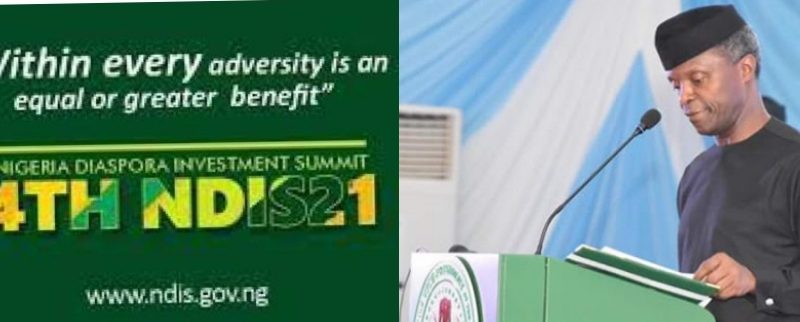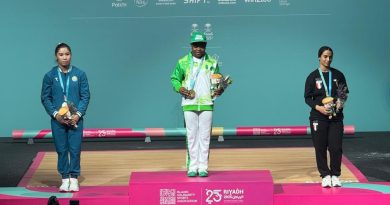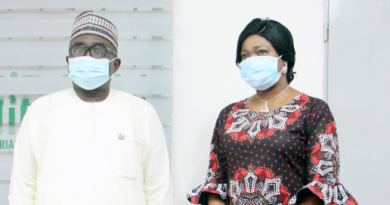OSINBAJO APPLUADS NiDCOM, NDIS. URGES ALL HANDS TO JOIN IN ACHIEVING THE ECONOMIC RECOVERY, GROWTH PLAN
Oru Leonard
Vice President of NIgeria, Professor Yomi Osinbajo has applauded the Nigerian Diaspora Commission (NiDCOM), and other Stakeholders for efforts into planning and organising the fourth Nigerian Diaspora Investment Summit (NDIS).
The Vice President Yemi Osinbajo who stated this while declaring open the 2021 edition of Nigerian Diaspora Investment Summit (NDIS), themed: “Diaspora Partnership and Linkages for Post-COVID Economic Growth, in a bid to fast-track the recovery of the country’s economy in this post-COVID era, at the Banquet Hall, Presidential Villa,Abuja Tuesday 16th, 2021, commended the inspiring leadership being provided by the Chairman/CEO of the Nigerians in Diaspora Commission (NiDCOM), Hon. Abike Dabiri-Erewa, and her team of collaborators.
“The Nigeria Diaspora Investment Summit (NDIS), has been held annually over the past three years and in this period, we note that it has incrementally been successful in attracting Diaspora investment into local businesses in the country. There have been series of investment success stories that buttress the fact that NDIS is fast becoming one of the surest platforms for attracting Diaspora investment into the country.
“At the Inaugural Nigeria Diaspora Investment Summit in 2018, we emphasised the focus of the Administration on the 2017-2020 Economic Recovery and Growth Plan (ERGP), designed to be consistent with the aspirations of the Sustainable Development Goals (SDGs). With the expiration of the Economic Recovery and Growth Plan (ERGP) last year, we are not relenting in our quest of attaining the goal of a bright and prosperous Nigeria for all Nigerians as we just unveiled the 2021-2025 Medium-Term National Development Plan (MTNDP) last month. The focus of the Administration in recovering and sustaining the economy has not changed but has been amplified with additional goals such as:
I. Putting he economy on a path of increasing per capita income to avert the past trend of higher population compared to the real GDP growth.
II. Broad-based economic growth of about 3.8 percent on average; with non-oil GDP growth of 4 percent and oil GDP growth of 2.1 percent.
III. A more competitive non-oil sector; and a more robust and resilient economy that is less dependent on the oil sector. IV. Increasing employment generation with a projected increase of about 25 million; with 10 million from direct growth impact and 15 million from skill-acquisition and other interventions. The projected real GDP growth during 2021-2025 would thus be sufficient to ensure that 10 million people do not fall into poverty.
V. An additional number of 25 million people will be taken out of poverty, ensuring that poverty rates will be at 31 percent by 2025 compare to 40 percent in 2020, the VP butressed.
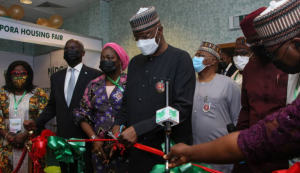
Osinbajo said the 2021 Nigeria Diaspora Investment Summit was very apt, as it was in line with one of the top priorities of President Buhari’s administration in the post-Covid-19 era, adding that repositioning the Nigeria’s economy is achievable with the partnership of the Diaspora.
He said, “The Diaspora over the decades have been known as senders of remittances which had continue to surpass oil revenue, translating to sometimes as high as six percent of Gross Domestic Product. Beyond their well known role as senders of remittances however, the Diaspora also promote trade and foreign direct investment, create businesses and spur entrepreneurship as we have been witnessing since the inauguration of this Summit in 2018.
“My office conducted a study to better understand the potential of Nigerians in Diaspora in investing in their homeland. We observed that the first generation Nigerians in Diaspora have keen interest in the economy of Nigeria and want to see it bloom, thus 70 percent of their remittances go into family support while 30 percent goes into investment. It is rather very obvious that Diaspora investment in entrepreneurship in the country still remains a significant area for their potential contributions to national development. The question however that arises is how do we create a nexus with the second and third generation to get them interested in the economy of the country and how do we partner with the Diaspora to get them much more involved in the economy of the nation in order to boost it?
“Based on our interaction with the Diaspora, we perceived that one of the major things that the Diaspora need to get involved in the economy is an enabling business environment and to this end, this Administration’s effort over the years has been to improve the business environment. Some of the efforts in this regard included the setting up of the Presidential Enabling Business Environment Council (PEBEC) in July 2016 to remove bureaucratic constraints to doing business in Nigeria and make the country a progressively easier place to start and grow a business. The PEBEC has created significant opportunities to boost local and foreign investments in the country with significant progress made. In five years, Ministries, Departments and Agencies (MDAs), State Governments, the National Assembly and the Judiciary have all implemented reforms by the PEBEC with far reaching impact on the business environment in Nigeria. Some key reforms implemented since the inception of the PEBEC include: the automation of companies’ registration by the Corporate Affairs Commission (CAC); facilitating the legal frameworks for the operation of Credit Reporting Bureaus and the use of movable assets as collaterals for loans in Nigeria. This means that registering a business now takes a shorter time and can also be done electronically, and access to credit and resources, for especially MSMEs that constitute a larger part of the economy, have been enhanced.
“We are all aware that COVID-19 wreaked damage on the global economy but it also provided unique opportunities for thinking out of the box in solving some of the problems in the world. As at last year, due to the pandemic, there was a -6% slowdown in the country’s second quarter GDP. Some innovative responses were therefore developed by this Administration in safeguarding the economy and attracting investments into the country. We listed some of these responses at the last Summit, one of which was to make the fiscal environment as attractive as possible through the instrumentality of the Finance Act, which was signed on 31st December, 2020, alongside the 2021 Appropriation Act by His Excellency, President Muhammadu Buhari GCFR. This reaffirms our commitment to enact fiscal policy annually alongside the passage of the annual budget into law. We have been able to use the Finance Act, which took effect on 1st January, 2021, to improve the business environment and further encourage investments into the country. The Act addresses the overall tax reforms, financial management and public revenue strategies by making numerous changes to legislations such as the Companies Income Tax Act, Stamp Duties Tax Act, Petroleum Profits Tax Act and Capital Tax Act. Based on these reforms, companies making contributions (in kind or cash) to complement the effort of the government during pandemics such as Covid-19, natural disasters or other exigencies, in addition to the usual allowable deductions are now eligible to claim deductions limited to 10% of their assessable profit. Furthermore, Companies (especially in the Financial Technology sector) can now claim capital allowance on capital expenditure for the acquisition or development of software. With the growing reliance on technology, this is a laudable policy to help grow local technological know-how and talents. Also, small companies are now exempt from paying Education Tax, while the minimum tax rate has now been reduced from 0.5% to 0.25% for companies with their assessment dates between 1st January, 2020 and 31st December, 2021. Again, services of notice of assessment can now explicitly be done by courier, email or any other electronic means as the Covid-19 Pandemic practically forced people to resort more to electronic means of personal and official transactions.
“Beyond the fiscal policies, as part of the Covid-19 recovery strategy, the Federal Government in June 2020 approved USD5.9 billion for the Nigeria Economy Sustainability Plan (NESP) in order to stimulate and diversify the economy, retain and create jobs, and extend more protections to the poor. The plan was articulated around key projects such as the Mass Agriculture Program, which was designed to span the entire agricultural value chain from farm to table with an estimated cost of N634billion. (During the pandemic, President Buhari constituted the Coid-19 committee member, Economic sustainability plan and these both committees contributed to the rapid exit of the country from Covid 19 pandemic.)
“The Nigeria Economy Sustainable Plan (NESP) incorporates projects such as: Extensive Public Works and Road Construction Programme; Mass Housing Programme, Installation of Solar Home Systems; Strengthening the Social Safety Net; Support for Micro, Small & Medium Enterprise; Reduction in National Agency for Food and Drug Administration (NAFDAC) registration fees; Survival Fund; Promotion of Domestic Gas Utilization; Digital Technology; some of which are key areas of focus of this Summit. It indicates to us that we are in sync and on track in charting the path of a growth trajectory for the nation and in addressing the key areas that will facilitate that desired growth.
“In addition, we also launched the Nigeria Digital Economy Policy and Strategy in 2019. The program is based on 8-pillars for the acceleration of the Nigerian economy:
i) Developmental Regulation
ii) Digital Literacy & Skills
iii) Solid Infrastructure
iv) Service Infrastructure
v) Digital Services Development & Promotion
vi) Soft Infrastructure
vii) Digital Society & Emerging Technologies
viii) Indigenous Content Development & Adoption.
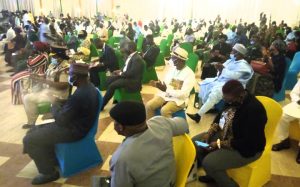
As part of measures to achieve this objective, the NCC rolled out the National Broadband Plan for 2020-2025. The Broadband Plan is designed to deliver data download speeds across Nigeria of a minimum 25Mbps in urban areas, and 10Mbps in rural areas, with effective coverage available to at least 90% of the population by 2025. All these are being put in place to encourage our youth and tech startups in Nigeria.
Another program in the works designed to transform agriculture and scale up productivity in Nigeria is the Green Imperative Nigeria-Brazil Bilateral Development Program. Its design is to sustain the economy through the use of Brazilian technology for the development of agricultural mechanization to make farming a dignified venture for Nigerian people and ultimately increase agricultural production and boost food security. This solution for Nigeria is the connection of the agricultural value chain through an investment package of initial financing of 100 billion dollars, set by the governments of Brazil and Nigeria to be used for the improvement of overall infrastructure in the rural areas of Nigeria. The key objective is to scale up the country’s agriculture through close collaboration between Nigerian and Brazilian industries for the delivery and use of technology to improve crops. In terms of outcome, the Green Imperative is still in its early stages of implementation. With the active and engaged participation of both countries through their respective Ministries of Foreign Affairs, Agriculture and Finance, the Green Imperative is part of the foreign agenda of both countries, thus representing a worthy cooperation initiative for a duration of 10 years with long term goals for food security, expanded job growth and ultimately boost food production and household incomes in Nigeria.
The project will have over two phases of implementation. The first phase will be allocation of over 200 million dollars for the creation of around 780 Agricultural Service Centres as the poles for catalyst through training and equipment sharing, while the second phase will be technology transfer from Brazil to Nigeria via the commercialization of agricultural equipment and inputs such as tractors, planters, seeders, fertilizers and pesticides. This program will provide another veritable avenue for investment and engagement by the Diaspora for sustainable outcomes.
Recovering the economy of the nation cannot be achieved by the government alone; we need the partnership and deep involvement of the Diaspora and foreign investors, among others, investing in local businesses to boost and diversify the economy. It is this realization that has driven this Administration’s support for the NDIS as a clarion call to our Diaspora and their friends to come and invest in a land of boundless opportunities and possibilities like the Chinese, Indians, Lebanese, Israelis and South Africans are already and successfully doing here in Nigeria. Last year witnessed a number of Diaspora investors heeding that call and it is encouraging to note that even more have turned up this year. We assure you of our commitment to ensure that your investments are not only secure but that you get a good rate of return on the investments you make, while basking in the glow of being contributors to the growth of business and development of the nation.
Osinbajo maintained that the Nigerian Diaspora Investment Summit (NDIS) 2021 organised by the non-profit voluntary sector Nigeria Diaspora Summit Initiative (NDSI) in collaboration with the Nigerians in Diaspora Commission (NiDCOM) was in consonance with the Buhari’s administration expectation of an expansion of the economic base through Diaspora investment..
” I certainly hope therefore that the Business to Business (B2B) connections on which this Summit is structured will result in the stated outcomes of attracting meaningful and sustainable Diaspora investments to boost economic growth and development of Nigeria”Osinbajo concluded.
Earlier in her welcome address,the Coordinator, Nigeria Diaspora Investment Summit 2021,Dr.Badewa Adejugbe-Williams said the summit which was inaugurated in the year 2018, with the intent of creating a veritable platform for the Diaspora to invest in local businesses, has over the years recorded some measure of success in attracting investments into the country. It is therefore not a surprise that this Summit has continuously enjoyed the deserved attendance of esteemed personalities.
“ Let me seize this opportunity with utmost humility and boundless pleasure to appreciate the Special Guest for this event, the Vice President of the Federal Republic of Nigeria, His Excellency, Professor Yemi Osinbajo GCON for his continuous and unwavering support towards the Summit ever since its inception.
“We at the Nigerians in Diaspora Commission (NiDCOM) and the Nigeria Diaspora Investment Summit Initiative (NDSI) are very grateful for your commitment to always participate at the Summit. It goes to show that this administration recognizes the enormous potentials of the Diaspora to the Nigeria’s development and is very resolute on tapping these potentials. We are optimistic that this support will continue in the years ahead, as we pursue our mandate with renewed zeal and focus.
“In the same vein, I will like to recognize the presence of our Guest of Honour, Mr Leo Stan Ekeh, a globally recognized tech guru who has inspired several generations of budding entrepreneurs and startups, many of whom are currently disrupting the technology space in Nigeria and beyond. He is the Chairman of the Zinox Group, Sub-Saharan Africa’s biggest integrated technology conglomerate through which he has deployed some of the biggest ICT projects in the continent. Please accept our profound congratulation for your wins, most especially the highly coveted Forbe’s Best Africa Leading Tech Icon Award that was recently conferred on you. With the recent surge of investment opportunities in the Information, Communication and Technology (ICT) sector of the Nigeria’s economy, we believe the choice for you to deliver a keynote speech tomorrow at this Summit is apt and most appropriate.
Dr.Adejugbe-Williams commended the Nigerians in Diaspora for their enormous contributions to the development of the nation, most especially during the height of the Covid-19, for the steps they took to support communities and alleviate the sufferings caused by the eruption of the pandemic. Some of the responses which included, but not limited to, provision of food assistance, provision of personal protective equipment (PPE), seminars on basic hygiene, training for health workers, educational programs for children during the lockdown, all played a key role in the government’s effort to tackle and reduce the Covid-19 caseload.
She said the Summit since its inception in 2018, has been living up to its expectations of attracting Diaspora investment into local business in Nigeria with bounteous success stories.
‘Beyond this, NDIS has over the years being expanding its participants’ network, showcasing their products and services to target audiences such as the Diaspora investors, sponsors and government actors. .
The Minister of State for Industry, Trade and Investment,Amb. Maryam Katagum also lauded the Nigeria in Diaspora Commission (NiDCOM) and the Nigerians in Diaspora Summit Initiative (NDSI) for organizing this year edition of the summit.
The Minister while delivering her goodwill message at the event said the Federal Government of Nigeria would continue to formulate and implement policies aimed at increased Foreign Direct Investment for national development.
She said the present administration, which took office in May 2015, recognized that the economy was likely to be on a persistent and rapid downward trend unless definite, coordinate and necessary steps were taken to improve it.
“It was in this regard that small businesses were acknowledged as constituting the backbone of any growing economy, and that in order to eliminate poverty and unemployment in the country, small firms needed to be supported, including through channeling foreign direct investments to them. It was therefore in this context that the Administration has taken many steps since its inception to address the difficulties they face and ensure that investment is directed to these businesses in the country.
“Ladies and Gentlemen, the earliest action taken by this government was the prioritization of three policy goals of tackling corruption, improving security and re-building the economy. Consequently, the Strategic Implementation Plan (SIP) for the 2016 Budget of Change was developed targeting initiatives that would support small businesses, as well as poor and vulnerable Nigerians.
” Building on the 2016 SIP, the President launched the Economic Recovery and Growth Plan (ERGP) which lasted from 2017 to 2020. The ERGP also yielded results and boosted the government’s efforts to revive the economy and attract foreign direct investment to Nigeria’s small and medium-sized businesses. Just recently, in continuation of its systematic strategy at addressing its goal for growth and diversification of the economy, the government unveiled the 2021-2025 Medium-Term National Development Plan (MTNDP) with the goal of amplifying the drive for economy recovery and sustenance of the economy, and attracting foreign direct investment into the country.
She explained that in furtherance to the President Buhari’s administration effort to attract foreign direct investment into the country, the Presidential Enabling Business Environment Council (PEBEC) was established to eliminate bureaucratic barriers to doing business in Nigeria and make the country a progressively easier place to start and grow a business. He said the PEBEC has created significant opportunities to boost local and foreign investments in the country with remarkable progress made. In five years, Ministries, Departments and Agencies (MDAs), State Governments, the National Assembly and the Judiciary have all implemented reforms by the PEBEC with far reaching impact on the business environment in Nigeria.
She however stated that Nigerians in Diaspora represented an indomitable force.
“They are flag bearers of Nigeria’s image, Nigeria’s entrepreneurial energy, Nigeria’s irrepressible spirit, Nigeria’s incredible can-do attitude. In business and in politics, in education and in sports, in entertainment and in science, in medicine and in arts, Nigerians have demonstrated across the world, what Nigerians genuinely represent. Furthermore, with the contributions of the Diaspora into the country over the years and their recent interventions during the Covid-19 period ranging from the supplies of PPE’s, through training and retraining of Covid-19 experts in the countries, to educating the citizens on safety measures, they have demonstrated that they are inestimable assets that the government should partner with in spurring rapid economic growth, most especially in this post-Covid era.
” As we seek to grow and diversify the economy and attracting foreign investment into our economy, it is therefore apt that we tap into our Diaspora, particularly at this time when we are witnessing a skewed shift in foreign direct investment as a result of the Covid-19 outbreak and certain inevitable problems that the Administration is working assiduously to overcome.
” I am very optimistic therefore that this Summit will be a very productive one and will indeed build on its success of attracting Foreign Direct Investment (FDI) from the Diaspora. It is my hope therefore that you all find it worthwhile to be here and to have participated at this Summit”the Minister added.
The Chairman of NiDCOM, Abike Dabiri-Erewa, on her part commended the Nigerians in Diaspora for their enormous contributions to the development of the nation, most especially during the height of the COVID-19, for the steps they took to support communities and alleviate the sufferings caused by the eruption of the pandemic.
“Some of the responses which included, but not limited to, provision of food assistance, provision of personal protective equipment (PPE), seminars on basic hygiene, training for health workers, educational programs for children during the lockdown, all played a key role in the government’s effort to tackle and reduce the COVID-19 caseload.
“if there is one single lesson to be learnt from this, it is the African proverb that says if you want to go fast, go alone, but if you want to go far, go together. It simply means that partnerships are essential for credible response with lasting effects. Therefore in the quest of the Federal Government to go far in repositioning the economy in this post COVID era, there is a need to partner with the Diaspora in achieving these goals. This is why the Summit with this year theme being Diaspora Partnership and Linkages for Post-COVID Economic Growth is very apt because it creates that avenue and platform of partnership between the Government and the Diaspora in attracting investment into local business and thus enhancing Foreign Direct Investment in the country.”

